In Facebook’s dreams, it’s a clean and private place. People spend their time having thoughtful discussions in “meaningful” Groups, planning offline meetups with Events, or laughing together in a Facebook Watch party.
In reality, Facebook is a cluttered mess of features that seem to constantly leak user data. People waste their time viewing inane News Feed posts from “friends” they never talk to, enviously stalking through photos of peers, or chowing on click-bait articles and viral videos in isolation. Facebook will never shake this reputation if it just keeps polishing its old features.
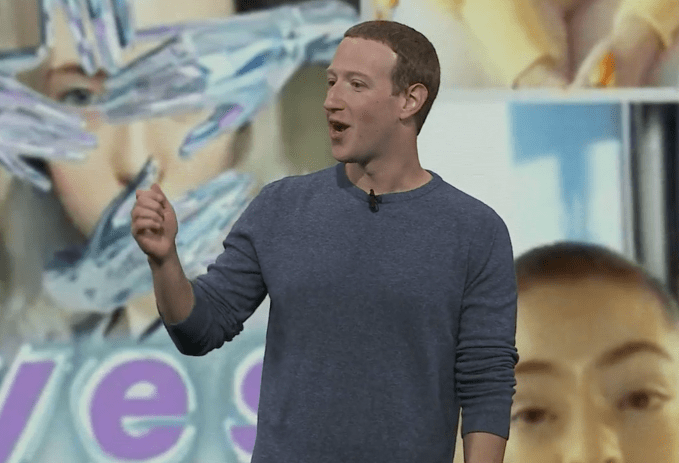
That’s why Facebook is rolling out what could be called an “aspirational redesign” known as FB5. Rather than polishing what Facebook was, it tries to spotlight what it wants to be. “This is the biggest change we’ve made to the Facebook app and site in five years” CEO Mark Zuckerberg said to open Facebook’s F8 conference yesterday.
The New Facebook
Most noticeably, that starts with sucking much of the blue out of the Facebook interface to making it look sparse and calming — despite a More button that unveils the social network’s bloat into dozens of rarely used features. A new logo features a brighter blue bubble around Facebook’s distinctive white f, which attempts to but a more uplifting spin on a bruised brand.
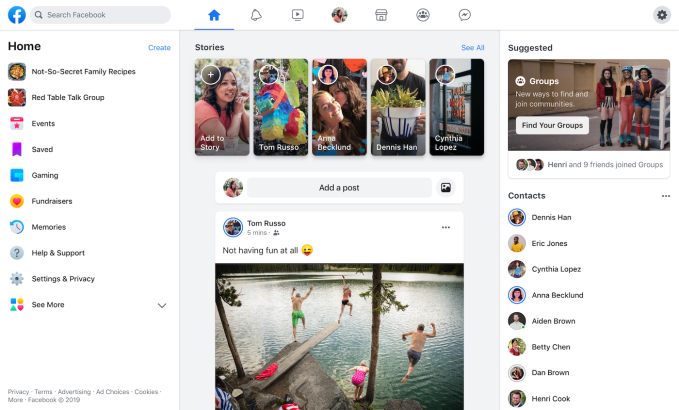
Functionally, FB5 means placing Groups near the center of a freshly tabbed interface for the both Facebook’s website and app, and putting suggestions for new ones to join across the service. “Everywhere there are friends, there should be Groups” says the head of the Facebook app Fidji Simo. Groups already has 1 billion monthly users, so Facebook is following the behavior pattern and doubling down. But Facebook’s goal is not only to have 2.38 billion people using the feature — the same number as use its whole app — but to get them all into meaningful Groups that emblematize their identity. 400 million already are. And now Groups for specific interests like gaming or health support will get special features, and power users will get a dashboard of updates across all their communities.
Groups will be flanked by Marketplace, perhaps the Facebook feature with the most latent potential. It’s a rapidly emerging use case Facebook wants to fuel. Just a a year and a half after launch, Marketplace had 800 million monthly users. Zuckerberg took Craigslist, added real identity to thwart bad behavior, and now is bolting it to the navigation bar of the most-used app on earth. The result is a place where it’s easy to put things up for sale and get tons of viewers. I once sold a couch on Marketplace in 20 minutes. Now sellers can take payments directly in the app instead of with cash or Venmo, and they can offer to ship items anywhere at the buyer’s expense. By following Zuckerberg’s mandate that 2019 focus on commerce, Facebook has become a viable Shopify competitor.
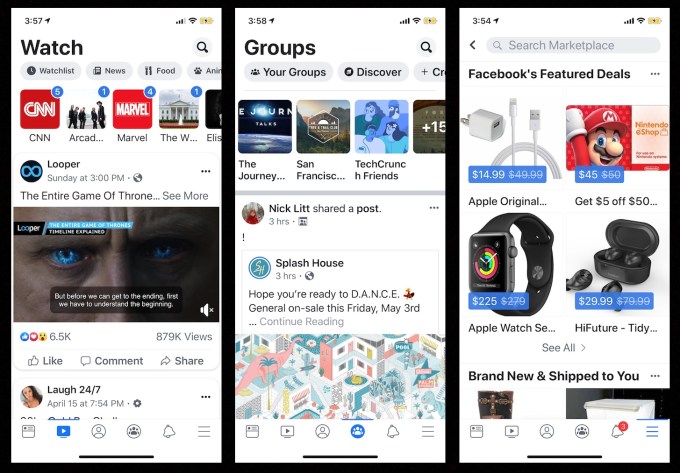
If Groups is what’s already working about Facebook’s future, Watch is the opposite. It’s a product designed to capture the video viewing bonanza Facebook observes on Netflix and YouTube. But without tent pole content like a “Game Of Thrones” or “Stranger Things”, it’s failed to impact the cultural zeitgeist. The closest thing it has to must-see video is Buffy The Vampire Slayer re-runs and a docuseries on NBA star Steph Curry. Facebook claims 75 million people now Watch for at least one minute per day though those 60 seconds don’t have to be sequential. That’s still just 4 percent of its users. And a Diffusion study found 50 percent of adult US Facebook users had never even heard of Watch. Sticking it front and center demonstrates Facebook commitment to making Watch a hit even if it has to cram it down our throats.
Not The Old Facebook
The products of the past got little love on stage at F8. Nothing new for News Feed, Facebook’s mint but also the source of its misinformation woes. In the age of Snapchat and Zuckerberg’s newfound insistence on ephemerality to prevent embarrassment, the Timeline profile chronicling your whole Facebook life got nary a mention. And Pages for businesses that were the center of its monetization strategy years ago didn’t find space in the keynote, similar to how they’ve been butted out of the News Feed by competition and Facebook’s philosophical shift from public content to friends and family.
The one thing we heard a lot about but didn’t actually see much of was privacy. Zuckerberg started the conference declaring “The future is private!” He spoke about how Facebook plans to make its messaging apps encrypted, how it wants to be a living room rather than just a town hall, and how it’s following the shift in user behavior away from broadcasting. But we didn’t see any new privacy protections for the developer platform, a replacement for its Chief Security Officer that’s been vacant for nine months, or the Clear History feature Zuckerberg announced last year.
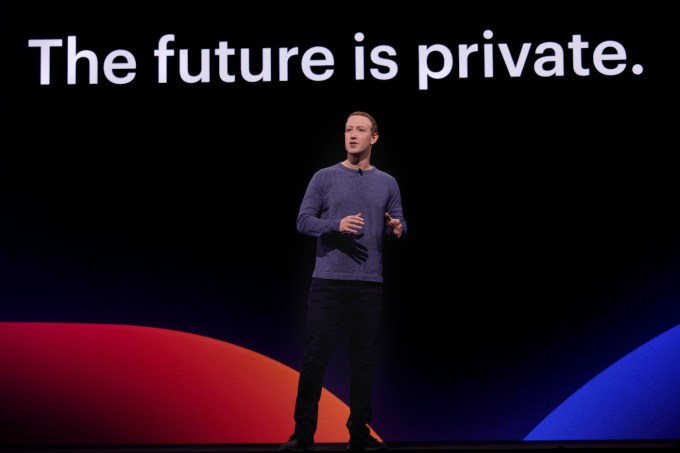
“I get that a lot of people aren’t sure that we’re serious about this. I know that we don’t exactly have the strongest reputation on privacy right now, to put it lightly” Zuckerberg joked without seeming to generate a single laugh. Combined with having little to show to enhance privacy, making fun of such a dire situation doesn’t instill much confidence. When Zuckerberg does take things seriously, it quickly manifests itself in the product like with Facebook’s 2012 shift to mobile, or in the company like with 2018’s doubling of security headcount. He knew mobile and content moderation failures could kill his network. But does someone who told Time magazine in 2010 that “What people want isn’t complete privacy” truly see a loose stance on privacy as an existential threat?
Interoperable, encrypted messaging will boost privacy, but it’s also just good business logic given Zuckerberg’s intention to own chat — the heart of your phone. Facebook’s creepiness stems from it sucking in data to power ad targeting. Nothing new was announced to address that. Despite his words, perhaps Zuckerberg doesn’t aspire to make Facebook as private as he aspired to make it mobile and secure.
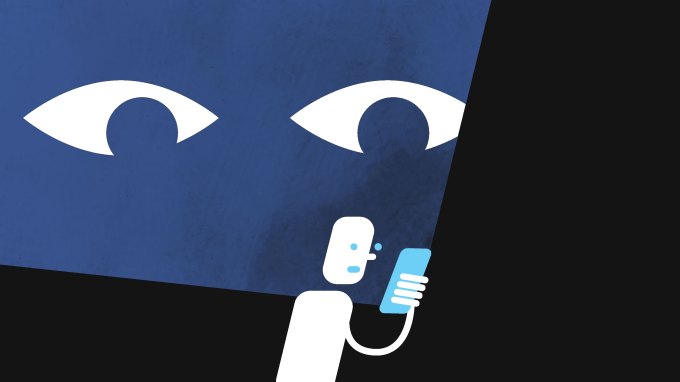
Wired reported that Zuckerberg authored a strategy book given to all employees ahead of the IPO that noted “If we don’t create the thing that kills Facebook, someone else will.” But F8 offered a new interpretation. Maybe given the lack of direct competitors in its league, and the absence of a mass exodus over its constant privacy scandals, it was the outdated product itself that was killing Facebook. The permanent Facebook. The all-you-do-is-scroll Facebook. The bored-of-my-friends Facebook. Users were being neglected rather than pushed away or stolen. By ignoring the past and emphasizing the products it aspires to have dominate tomorrow — Groups, Marketplace, Watch — Facebook can start to unchain itself from the toxic brand poisoning its potential.
from TechCrunch https://tcrn.ch/2GS7pNb








0 comments:
Post a Comment